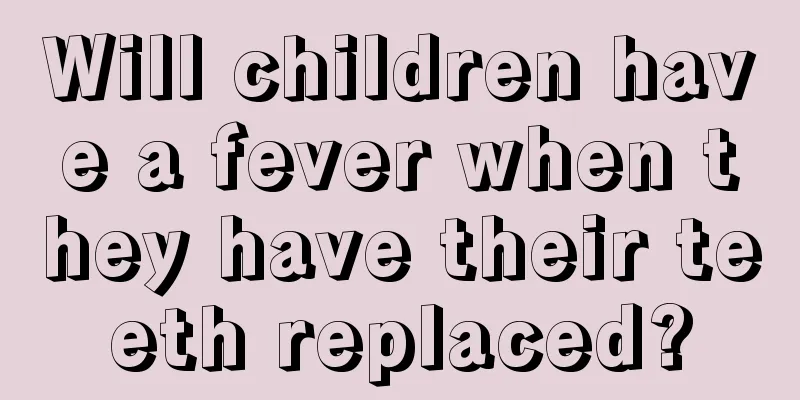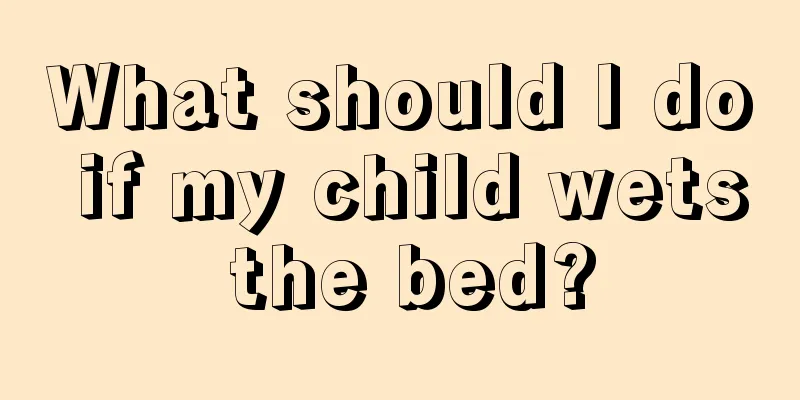Will children have a fever when they have their teeth replaced?

|
As babies grow older, they will show symptoms of tooth replacement. Teeth are a very important part of everyone's body. Teeth are not only used for chewing, but are also very beneficial to physical health. Some children will have a fever when their teeth are replaced, but a child's fever is not necessarily caused by tooth replacement. There are many reasons that may cause a baby to have a fever, and it is necessary to find out the cause and treat it symptomatically. What to do if you have a fever while changing teeth When babies are in the stage of teething, most babies generally do not have a fever. If your baby has a fever when changing teeth, it is most likely caused by a cold or inflammation. For severe fever symptoms, it is recommended to take the baby to the hospital for treatment, take antipyretic drugs and combine them with cold or heat-removing drugs for treatment at the same time. During the treatment, you should keep warm to avoid catching a cold again which may worsen your cold and fever. Another reason may be that after the teeth become loose, the baby always uses his hands to move them, or does not pay attention to oral hygiene, which can cause bleeding in the loosened parts of the deciduous teeth, and the bleeding gums are more likely to cause infection. This condition is also prone to fever symptoms. For this type of fever, treatment should be targeted at the inflammation of the oral cavity. You can take symptomatic antibacterial or antibiotic treatment under the guidance of a doctor. During the treatment, your baby should drink plenty of water to speed up the excretion of drug residues and reduce the toxic side effects of anti-inflammatory drugs. Causes of fever in children due to tooth replacement Oral infection When children are in the stage of replacing teeth, the teeth grow out from the inside of the teeth and will inevitably break through the epithelial tissue of the gums, forming a damaged surface. If germs come into contact with the wound at this time, it may cause infection and fever. Reduced resistance The irritation to the oral cavity during teething may cause a decrease in the body's resistance. Children's diet may also be affected. At this time, the resistance to various adverse external environments is weak, which makes it easy to be infected by bacteria, and the chance of catching a cold may increase, which can cause fever. Hygiene is not thorough During teething, if oral hygiene is not done properly and there is oral trauma, and if the things you bite are unhygienic, bacteria may enter the mouth directly and cause infection, or even other diseases such as enteritis. |
<<: What calcium supplements are good for children to take when their teeth are changing?
>>: Why do new teeth not grow for a year when they are replaced?
Recommend
What is the normal body temperature for premature babies?
For newborns, due to different physical constitut...
Is it good for children to eat pine nuts?
In the northern part of my country, because there...
How to completely remove body odor in children
There are many causes of body odor, and the incid...
What are the symptoms of children with congenital heart disease?
Congenital heart disease will affect and threaten...
How can children build muscle?
Many children like sports since childhood and wan...
Why are children's underwear yellow?
When adult women's underwear turns yellow, it...
How do anal polyps form?
Anal polyps are lumps that grow on the anal canal...
Is it good to sunbathe if you have eczema?
Eczema is a very common disease. There will be ma...
How do hemangiomas form in newborns?
Nowadays, environmental pollution is getting wors...
Diaper rash in children
A rash is a skin disease and is often a serious p...
What should I do if my child has poor sleep quality?
If children have poor sleep quality, then parents...
How to prevent intermittent strabismus in children?
Eyes are the windows to the soul, so it is very i...
The harm of holding a three-month-old baby to urinate
Some children are prone to frequent urination whe...
What causes tics in children?
Childhood tics are related to many factors. If yo...
What is the correct treatment for enteritis in children?
Pediatric enteritis is a disease that cannot be i...









